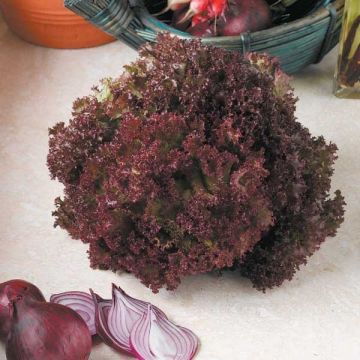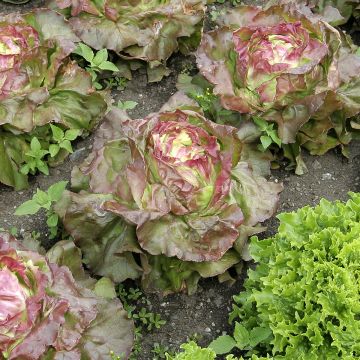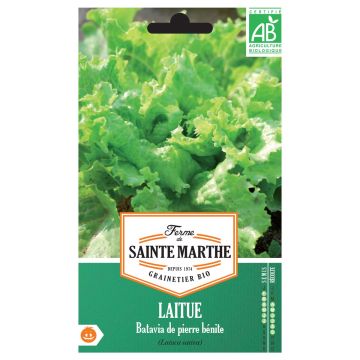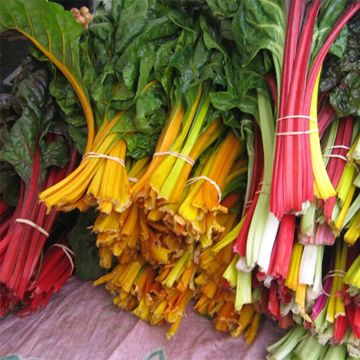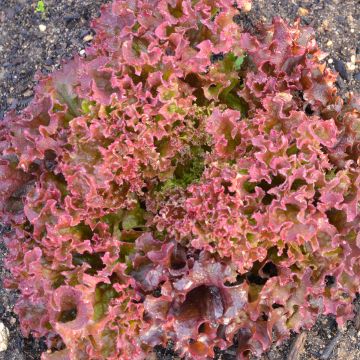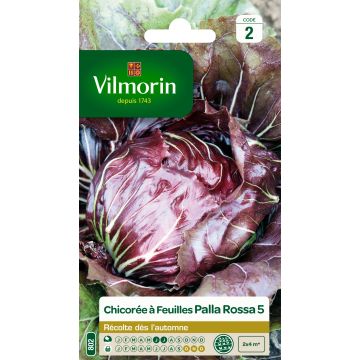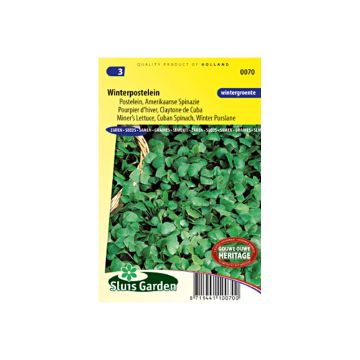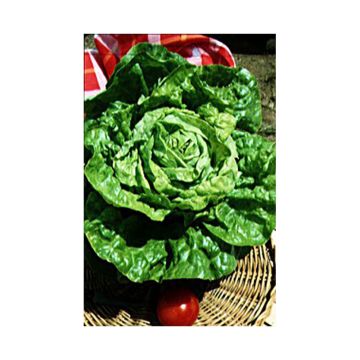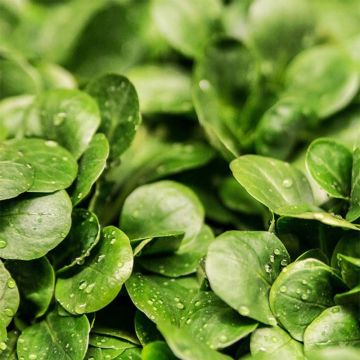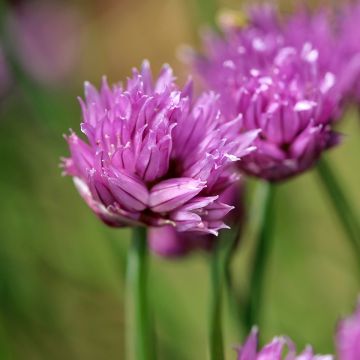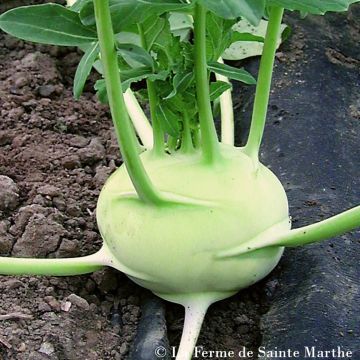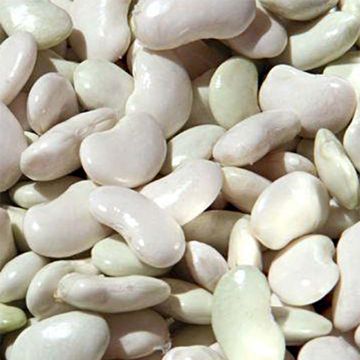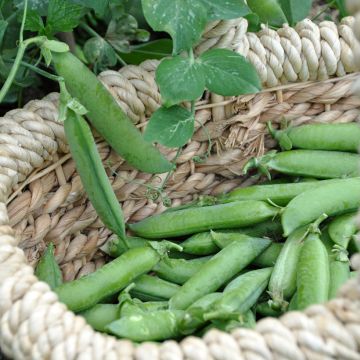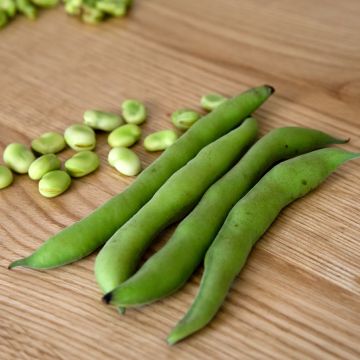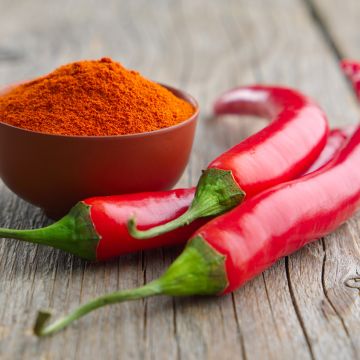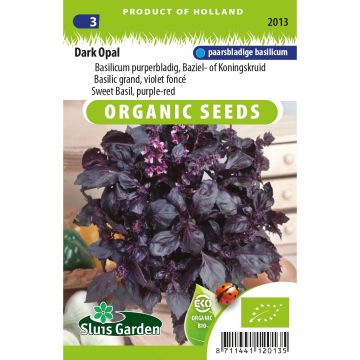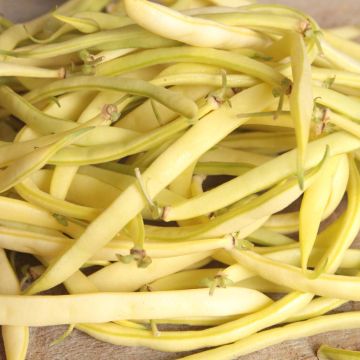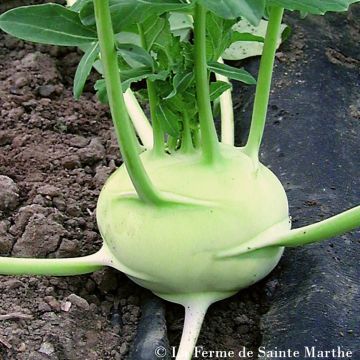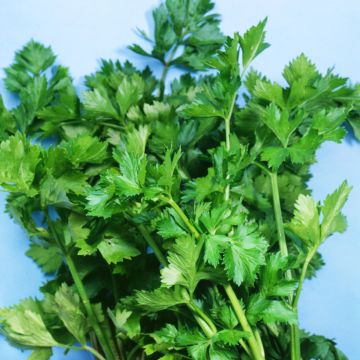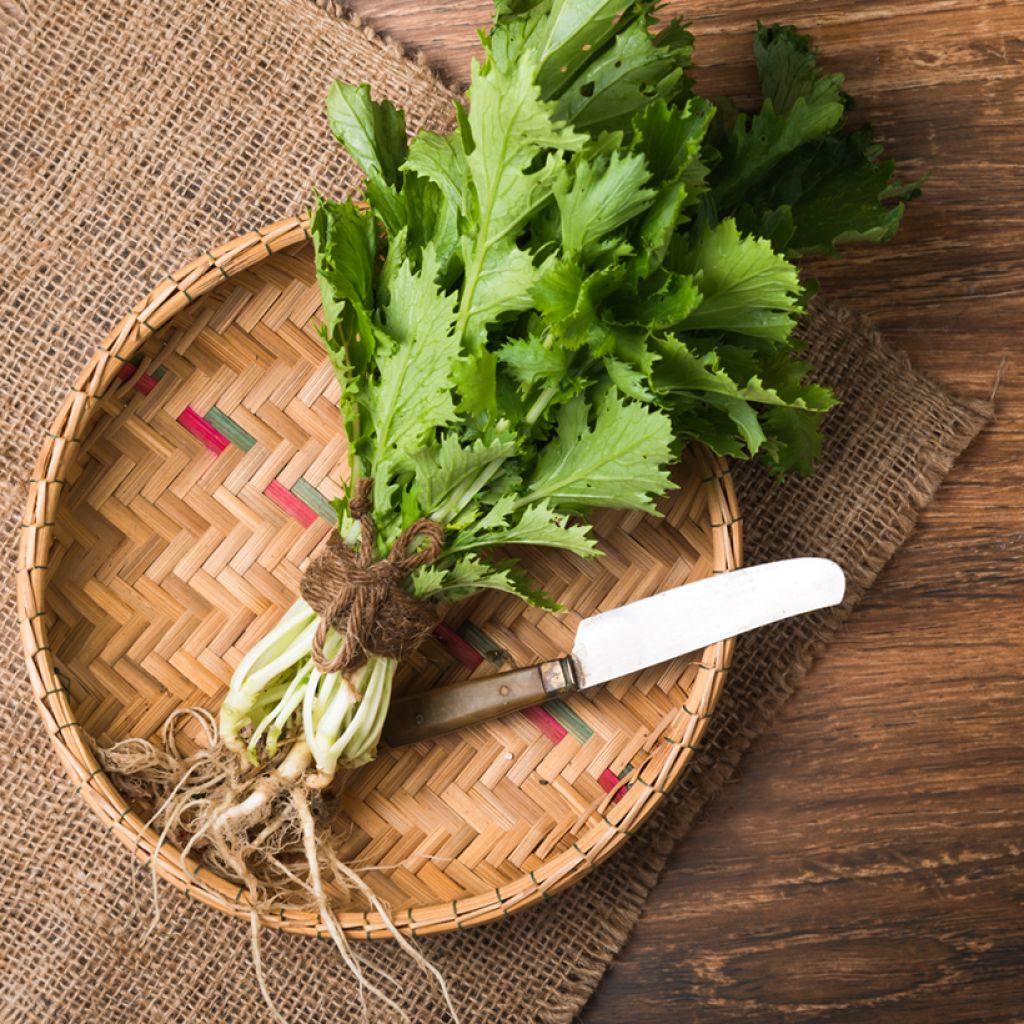

Mizuna Kyoto - untreated Field Mustard seeds - Ferme de Sainte Marthe seeds


Mizuna Kyoto - untreated Field Mustard seeds - Ferme de Sainte Marthe seeds
Mizuna Kyoto - untreated Field Mustard seeds - Ferme de Sainte Marthe seeds
Brassica campestris Japonica
Field Mustard, Wild Mustard, Wild Turnip
This plant carries a 6 months recovery warranty
More information
We guarantee the quality of our plants for a full growing cycle, and will replace at our expense any plant that fails to recover under normal climatic and planting conditions.
Seed-only orders are dispatched by sealed envelope. The delivery charge for seed-only orders is €3.90.
Delivery to Corse prohibited: UE law prohibits the import of this plant from mainland France to Corse as part of the fight against Xylella fastidiosa. Please accept our sincere apologies.
More information
Description
The Mizuna 'Kyoto' is a fast-growing variety of Asian cabbage. Its dark green leaves are highly serrated and their petioles are white. Rich in vitamins A and C, and calcium, this leafy vegetable is consumed raw in salads or cooked like spinach or stir-fried. Sow from March to September for harvests from April to October.
Japanese cabbages, or mustards, are vegetable plants that belong, like their European counterparts, to the large family of Brassicaceae and are named after the Brassica species. These cabbages, which were once only found in specialised shops a few years ago, are gradually gaining ground on our shelves and in our vegetable gardens, much to the delight of Asian cuisine enthusiasts. They are biennial plants grown as annuals that are full of qualities, both in terms of taste and nutrition. From a dietary point of view, they are remarkable: low in calories, they are very rich in vitamins C, A, potassium, and calcium. In cooking, these cabbages can be consumed raw or quickly stir-fried in a wok.
Harvest: it is harvested as needed. If the plant is well established, cutting all the leaves at the collar level allows for regrowth.
Storage: it can be stored in the refrigerator for a few days.
Gardener's tip: To limit watering, we recommend that when the plants are well developed, you mulch the soil with thin successive layers of grass clippings, if possible mixed with dead leaves. This protection, which keeps the soil moist, also reduces weed growth.
Untreated or "NT" seeds come from conventionally grown plants (often with the use of pesticides), but they undergo no treatment after harvest. These seeds are allowed in organic market gardening when organic seeds are out of stock.
Report an error about the product description
Harvest
Plant habit
Foliage
Botanical data
Brassica
campestris
Japonica
Brassicaceae
Field Mustard, Wild Mustard, Wild Turnip
Cultivar or hybrid
Annual
Other Salad leaf seeds
Planting and care
Sowing:
Sowing period: in open ground from March to September
Harvest period: from April to October
You can either sow directly in place or prepare young plants that will later be transplanted to their final location in the garden.
Preparing young plants: In a greenhouse or nursery in the garden throughout the year (depending on the recommended sowing period), sow the seeds at a depth of 1 to 2 cm (0 to 1in) in good seed compost or fine soil. Lightly cover with compost and remember to keep the substrate moist but not waterlogged.
When the young plants appear strong enough to handle, transplant them into pots if necessary before planting them in the garden, when there is no longer any risk of frost. During planting, respect the recommended spacing for direct sowing.
Direct sowing: In well-amended and finely worked soil, make furrows about one or two centimeters deep, spaced 20 centimeters (8 inches) apart. Sow the seeds and cover them with a thin layer of fine soil. When the seedlings are well developed, thin them out, leaving one plant every 20 centimetres (8 inches).
Cultivation:
Mustards grow in full sun. It is a demanding vegetable that requires well-rotted, nitrogen-rich and potassium-rich soil. It is advisable to apply a generous amount of mature compost (about 3/4 kg per m2) in autumn, by hoeing to a depth of 5 cm (2in), after loosening the soil as you would for any vegetable crop. It is not very tolerant of soil pH, which should be between 5.6 and 6.5. In acidic soil, it is necessary to gradually raise the pH by adding calcium in the form of Dolomite or Lime.
Beware of pests such as Cabbage White butterflies or Flea Beetles and consider installing insect netting.
Seedlings
Care
Intended location
This item has not been reviewed yet - be the first to leave a review about it.
Vegetable seeds
Haven't found what you were looking for?
Hardiness is the lowest winter temperature a plant can endure without suffering serious damage or even dying. However, hardiness is affected by location (a sheltered area, such as a patio), protection (winter cover) and soil type (hardiness is improved by well-drained soil).

Photo Sharing Terms & Conditions
In order to encourage gardeners to interact and share their experiences, Promesse de fleurs offers various media enabling content to be uploaded onto its Site - in particular via the ‘Photo sharing’ module.
The User agrees to refrain from:
- Posting any content that is illegal, prejudicial, insulting, racist, inciteful to hatred, revisionist, contrary to public decency, that infringes on privacy or on the privacy rights of third parties, in particular the publicity rights of persons and goods, intellectual property rights, or the right to privacy.
- Submitting content on behalf of a third party;
- Impersonate the identity of a third party and/or publish any personal information about a third party;
In general, the User undertakes to refrain from any unethical behaviour.
All Content (in particular text, comments, files, images, photos, videos, creative works, etc.), which may be subject to property or intellectual property rights, image or other private rights, shall remain the property of the User, subject to the limited rights granted by the terms of the licence granted by Promesse de fleurs as stated below. Users are at liberty to publish or not to publish such Content on the Site, notably via the ‘Photo Sharing’ facility, and accept that this Content shall be made public and freely accessible, notably on the Internet.
Users further acknowledge, undertake to have ,and guarantee that they hold all necessary rights and permissions to publish such material on the Site, in particular with regard to the legislation in force pertaining to any privacy, property, intellectual property, image, or contractual rights, or rights of any other nature. By publishing such Content on the Site, Users acknowledge accepting full liability as publishers of the Content within the meaning of the law, and grant Promesse de fleurs, free of charge, an inclusive, worldwide licence for the said Content for the entire duration of its publication, including all reproduction, representation, up/downloading, displaying, performing, transmission, and storage rights.
Users also grant permission for their name to be linked to the Content and accept that this link may not always be made available.
By engaging in posting material, Users consent to their Content becoming automatically accessible on the Internet, in particular on other sites and/or blogs and/or web pages of the Promesse de fleurs site, including in particular social pages and the Promesse de fleurs catalogue.
Users may secure the removal of entrusted content free of charge by issuing a simple request via our contact form.
The flowering period indicated on our website applies to countries and regions located in USDA zone 8 (France, the United Kingdom, Ireland, the Netherlands, etc.)
It will vary according to where you live:
- In zones 9 to 10 (Italy, Spain, Greece, etc.), flowering will occur about 2 to 4 weeks earlier.
- In zones 6 to 7 (Germany, Poland, Slovenia, and lower mountainous regions), flowering will be delayed by 2 to 3 weeks.
- In zone 5 (Central Europe, Scandinavia), blooming will be delayed by 3 to 5 weeks.
In temperate climates, pruning of spring-flowering shrubs (forsythia, spireas, etc.) should be done just after flowering.
Pruning of summer-flowering shrubs (Indian Lilac, Perovskia, etc.) can be done in winter or spring.
In cold regions as well as with frost-sensitive plants, avoid pruning too early when severe frosts may still occur.
The planting period indicated on our website applies to countries and regions located in USDA zone 8 (France, United Kingdom, Ireland, Netherlands).
It will vary according to where you live:
- In Mediterranean zones (Marseille, Madrid, Milan, etc.), autumn and winter are the best planting periods.
- In continental zones (Strasbourg, Munich, Vienna, etc.), delay planting by 2 to 3 weeks in spring and bring it forward by 2 to 4 weeks in autumn.
- In mountainous regions (the Alps, Pyrenees, Carpathians, etc.), it is best to plant in late spring (May-June) or late summer (August-September).
The harvesting period indicated on our website applies to countries and regions in USDA zone 8 (France, England, Ireland, the Netherlands).
In colder areas (Scandinavia, Poland, Austria...) fruit and vegetable harvests are likely to be delayed by 3-4 weeks.
In warmer areas (Italy, Spain, Greece, etc.), harvesting will probably take place earlier, depending on weather conditions.
The sowing periods indicated on our website apply to countries and regions within USDA Zone 8 (France, UK, Ireland, Netherlands).
In colder areas (Scandinavia, Poland, Austria...), delay any outdoor sowing by 3-4 weeks, or sow under glass.
In warmer climes (Italy, Spain, Greece, etc.), bring outdoor sowing forward by a few weeks.


































